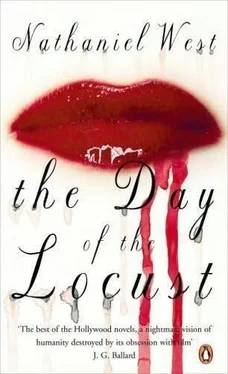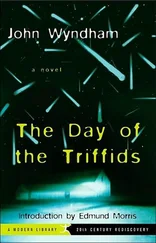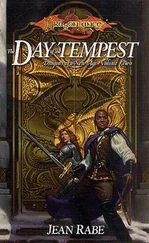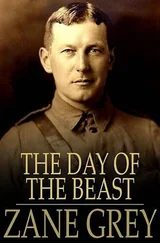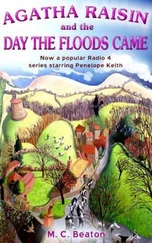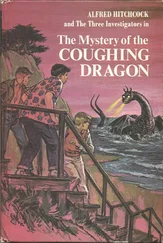She turned to Tod.
“What the devil can you do with a slob like that?” The orchestra started and Tod was able to ignore her question. All three of them turned to watch a young man in a tight evening gown of red silk sing a lullaby.
“Little man, you’re crying,
I know why you’re blue,
Someone took your kiddycar away;
Better go to sleep now,
Little man, you’ve had a busy day…”
He had a soft, throbbing voice and his gestures were matronly, tender and aborted, a series of unconscious caresses. What he was doing was in no sense parody; it was too simple and too restrained. It wasn’t even theatrical. This dark young man with his thin, hairless arms and soft, rounded shoulders, who rocked an imaginary cradle as he crooned, was really a woman.
When he had finished, there was a great deal of applause. The young man shook himself and became an actor again. He tripped on his train, as though he weren’t used to it, lifted his skirts to show he was wearing Paris garters, then strode off swinging his shoulders. His imitation of a man was awkward and obscene.
Homer and Tod applauded him.
“I hate fairies,” Faye said.
“All women do.”
Tod meant it as a joke, but Faye was angry.
“They’re dirty,” she said.
He started to say something else, but Faye had turned to Homer again. She seemed unable to resist nagging him.
This time she pinched his arm until he gave a little squeak. “Do you know what a fairy is?” she demanded.
“Yes,” he said hesitatingly.
“All right, then,” she barked. “Give out! What’s a fairy?” Homer twisted uneasily, as though he already felt the ruler on his behind, and looked imploring at Tod, who tried to help him by forming the word “homo” with his lips.
“Morro,” Homer said.
Faye burst out laughing. But his hurt look made it impossible not to relent, so she patted his shoulder.
“What a hick,” she said.
He grinned gratefully and signaled the waiter to bring another round of drinks.
The orchestra began to play and a man came over to ask Faye to dance.
Without saying a word to Homer, she followed him to the floor.
“Who’s that?” Homer asked, chasing them with his eyes. Tod made believe he knew and said that he had often seen him around the San Berdoo. His explanation satisfied Homer, but at the same time set him to thinking of something else. Tod could almost see him shaping a question in his head.
“Do you know Earle Shoop?” Homer finally asked. “Yes.” Homer then poured out a long, confused story about a dirty black hen. He kept referring to the hen again and again, as though it were the one thing he couldn’t stand about Earle and the Mexican. For a man who was incapable of hatred, he managed to draw a pretty horrible picture of the bird.
“You never saw such a disgusting thing, the way it squats and turns its head. The roosters have torn all the feathers off its neck and made its comb all bloody and it has scabby feet covered with warts and it cackles so nasty when they drop it into the pen.”
“Who drops it into what pen?’
“The Mexican.”
“Miguel?”
“Yes. He’s almost as bad as his hen.’
“You’ve been to their camp?”
“Camp?”
“In the mountains?”
“No. They’re living in the garage. Faye asked me if I minded if a friend of hers lived in the garage for a while because he was broke. But I didn’t know about the chickens or the Mexican…Lots of people are out of work nowadays.”
“Why don’t you throw them out?”
“They’re broke and they have no place to go. It isn’t very comfortable living in a garage.”
“But if they don’t behave?”
“It’s just that hen. I don’t mind the roosters, they’re pretty, but that dirty hen. She shakes her dirty feathers each time and clucks so nasty.” “You don’t have to look at it.”
“They do it every afternoon at the same time when I’m usually sitting in the chair in the sun after I get back from shopping with Faye and just before dinner The Mexican knows I don’t like to see it so he tries to make me look just for spite. I go into the house, but he taps on the windows and calls me to come out and watch. I don’t call that fun. Some people have funny ideas of what’s fun.”
“What’s Faye say?”
“She doesn’t mind the hen. She says it’s only natural.” Then, in case Tod should mistake this for criticism, he told him what a fine, wholesome child she was. Tod agreed, but brought him back to the subject.
“If I were you,” he said, “I’d report the chickens to the police. You have to have a permit to keep chickens in the city. I’d do something and damned quick.”
Homer avoided a direct answer.
“I wouldn’t touch that thing for all the money in the world. She’s all over scabs and almost naked. She looks like a buzzard. She eats meat. I saw her one time eating some meat that the Mexican got out of the garbage can. He feeds the roosters grain but the hen eats garbage and he keeps her in a dirty box.”
“If I were you, rd throw those bastards out and their birds with them.” “No, they’re nice enough young fellows, just down on their luck, like a lot of people these days, you know. It’s just that hen…” He shook his head wearily, as though he could smell and taste her. Faye was coming back. Homer saw that Tod was going to speak to her about Earle and the Mexican and signaled desperately for him not to do it. She, however, caught him at it and was curious.
“What have you guys been chinning about?”
“You, darling,” Tod said. “Homer has a t.l. for you.”
“Tell me, Homer.”
“No, first you tell me one.”
“Well, the man I just danced with asked me if you were a movie big shot.” Tod saw that Homer was unable to think of a return compliment so he spoke for him.
“I said you were the most beautiful girl in the place.”
“Yes,” Homer agreed. “That’s what Tod said.”
“I don’t believe it. Tod hates me. And anyway, I caught you telling him to keep quiet. You were shushing him.” She laughed. “I bet I know what you were talking about.” She mimicked Homer’s excited disgust. “’That dirty black hen, she’s all over scabs and almost naked.’” Homer laughed apologetically, but Tod was angry. “What’s the idea of keeping those guys in the garage?” he demanded. “What the hell is it your business?” she replied, but not with real anger. She was amused.
“Homer enjoys their company. Don’t you, sloppyboppy?” “I told Tod they were nice fellows just down on their luck like a lot of people these days. There’s an awful lot of unemployment going around.” “That’s right,” she said. “If they go, I go.”
Tod had guessed as much. He realized there was no use in saying anything.
Homer was again signaling for him to keep quiet. For some reason or other, Faye suddenly became ashamed of herself. She apologized to Tod by offering to dance with him again, flirting as she suggested it. Tod refused.
She broke the silence that followed by a eulogy of Miguel’s game chickens, which was really meant to be an excuse for herself. She described what marvelous fighters the birds were, how much Miguel loved them and what good care he took of them.
Homer agreed enthusiastically. Tod remained silent. She asked him if he had ever seen a cock fight and invited him to the garage for the next night. A man from San Diego was coming north with his birds to pit them against Miguel’s.
When she turned to Homer again, he leaned away as though she were going to hit him. She flushed with shame at this and looked at Tod to see if he had noticed. The rest of the evening, she tried to be nice to Homer. She even touched him a little, straightening his collar and patting his hair smooth. He beamed happily.
Читать дальше
